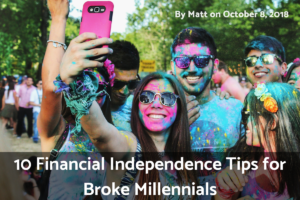My introduction to personal finance happened on a random day driving home from work early 2017. I was browsing AM radio stations and one caught my attention. I turned to a station where this man I’ve never heard of was talking about getting debt free, investing and the “Dave Ramsey baby steps.” I had no clue what the guy was talking about, but he definitely caught my attention. Little did I know this guy would forever change my outlook on personal finances. However, as I began to listen more and more and even read his really awesome book “The Total Money Makeover,” I soon realized there was more information about money that I lacked.
Not long after “meeting” Dave Ramsey on my radio I started doing more research. I began to discover more financially independent (FI) wizards out there like The Madfientist and Mr. Money Mustache who are all about personal finance and pushing the limits of attaining financial independence sooner than later. Still, I have held on to many of Dave Ramsey’s principles while welcoming new ones. So, let’s dive into a few of his teachings and learn more so you can make the best and most optimal financial choices for you and your family.
Getting out of debt
This is where Dave and people in the FIRE (Financial Independence Retire Early) community agree for the most part. I personally choose to not have any debt whatsoever, except a home mortgage and we’ll discuss that later in this article. For getting out of debt, I lean towards the Dave Ramsey baby steps and strategy of the “debt snowball.” Basically, you list all your debts smallest to largest. When you finish paying off the smallest debt you can take that minimum payment or whatever extra you were paying and apply it to the next smallest debt. You keep this going until all your debts are paid off. Believe me, it works! Even Harvard agrees which basically makes it law, right?
Saving while in debt
Ramsey’s baby step 4 is to save 15% into retirement after getting out of debt. I find this difficult to follow if you work for a company that offers a match to your 401(k) or 403(b) contribution. That’s free money you’re giving away. Here I’d like to take into account your net worth. By investing up to your company match you are building a more awesome and comfortable retirement for your future. While tackling debt I decided investing up to the company match was best.
Another point I don’t like is the 15% recommendation. I personally don’t feel it’s enough to save and invest. Once you’re debt free try saving and investing 30-50% of your income. You’ll most likely get some pretty awesome tax benefits and have options to retire to whatever you want whenever you choose to. And remember as I wrote in an earlier post, use low-cost index funds.
Credit cards
One of my first articles was about the use of credit cards. I learned a long time ago to simply stay away from credit cards. I remember defaulting on my first credit card I got in college. After that I vowed to never have one again. Of course, that was not true. I did get a second credit and had it for about two years before I closed it. I never was late on a payment on that one.
I get it. There are those who can responsibly use a credit each month without carrying over a balance. However, there are only a few of you who can. Even though I was handling my second credit card the right way I made the choice for myself to simply stay away. So, on this issue I have to agree with Dave Ramsey for the vast majority of people. However, I understand if you want a credit card as long as you stay current EVERY month and never carry a balance. The interest rates you can get hit with are so ugly you will want to cry and cry some more.
Buying a house
Buying a house is a big decision which I actually plan to discuss in detail later this year. For now, I’ll say that getting a 15-year mortgage with 20% down and a monthly payment less than 25% of your income is probably the best way to buy a home. Unless you can pay straight cash for it of course. This is the advice of Dave Ramsey. One disagreement I have is that the 25% of income might be a little high.
I personally don’t want a mortgage more than 20% of our take home income. This is because I want to save anywhere from 30-50% of our income for retirement. This savings rate practice is what I’ve learned from the FI community and want to implement in my own life. There is something nice about not having so much of your income going to one thing like a house. 25% is not a lot if you have no other debt. Still, I think a monthly mortgage that’s closer to 20% of your income or even less helps you do more with your life.
Mutual Funds Choices
Simply put the financial independent camp wins this argument. Low cost index funds are the way to go. To be fair, Dave Ramsey doesn’t mind index funds. He does advertise the work of financial professionals in his “SmartVestor” services and from what I gather low cost index funds are not typically the choices promoted. When you do the math and research low cost index funds are going to outperform the majority of actively managed mutual funds long term. Whether you’re investing in a taxable or tax advantage savings account I highly recommend you look at total market index funds and total bond index to have in your portfolio. Remember to keep the math of financial independence simple.
What now after Dave Ramsey?
As I’ve stated before, Dave Ramsey changed my outlook on personal finances and that was a positive. I strongly believe he is a great advocate of financial freedom and the Dave Ramsey baby steps are excellent for anyone just starting on the path to financial independence. However, there are some tweaks and improvements that can be made to his baby steps and this is why the financial independence movement exists. This is why Habesha Finance exists. We’re here to provide you more information and more optimal ways of achieving financial independence. We get this and now it’s your turn.


